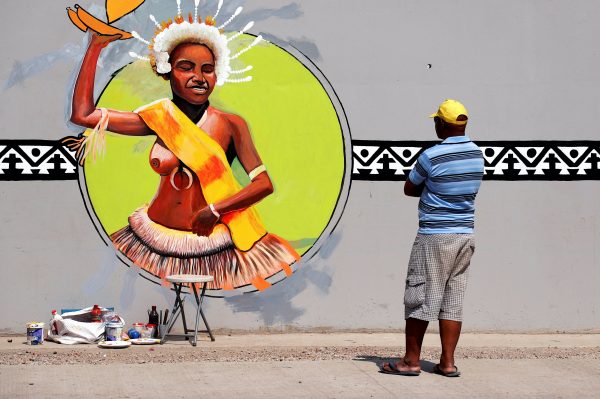The extent of gender-based violence in PNG is hard to measure given there is no reliable official data. The latest Demographic and Health Survey (2016–2018) reveals that 56 per cent of women aged 15–49 interviewed have experienced physical violence since age 15, and 28 per cent have experienced sexual violence. Of women aged 15–19, 38 per cent experienced physical violence in the 12 months preceding the survey.
The death of Jenelyn Kennedy sparked fresh public outrage in the country. There were calls for harsher penalties for perpetrators of gender-based violence, changes in the law to protect women and more proactive policing. Concerned citizens rallied together, calling for an end to gender-based violence and forming pressure groups such as Justice for Jenelyn, ManUP and End the Silence.
There is widespread acknowledgement of the need for change, and that this must include men and women working in partnership. It is hoped that this public concern and advocacy continues, even while the COVID-19 pandemic has taken centre stage. At the political level, National Capital District Governor Powes Parkop has been at the forefront of advocating for political action with the recently formed coalition of Governors, committing themselves to taking all action necessary to reduce gender-based violence and promote gender equality, respect and partnership.
The PNG National Strategy to Prevent and Respond to Gender Based Violence 2016–2025 provides a framework through which the issue should be addressed. It calls for high-level oversight in the form of a parliamentary committee and a national secretariat to oversee, support and lobby for resources to sustain the fight against gender-based violence throughout the country.
The Sorcery National Action Plan also provides a basis for national and provincial-level responses to sorcery accusation-related violence. While this affects men and women, in some parts of the country it is mainly women being accused and tortured.
The priority areas for action are threefold: setting up the National Gender-Based Violence Secretariat, better resourcing referral pathways and progressing an implementation strategy for the National Action Plan to address sorcery accusation-related violence.
There is no need to reinvent the wheel — tougher penalties for perpetrators would help, but so would the better enforcement of existing laws. In the police force, specialised family and sexual violence units already exist but are not yet incorporated into the Royal Papua New Guinea Constabulary structure. Their response is further hampered by the limited police-to-population ratio, fear of police and low public confidence due to violence committed by police. In sorcery accusation-related cases, police are geographically constrained, lack fuel, and are often outgunned and outnumbered.
Gender-based violence must be viewed not only as a law and order issue, but also as a health and economic issue that needs a response from all sectors of society. There needs to be greater investment in psychosocial services for both survivors and perpetrators.
Support must be given to promising local initiatives. Despite the many challenges, there are stories of hope in the work of committed community-based organisations such as Voices for Change, Highlands Human Rights Defenders, Kafe Women’s Association, PNG Human Rights Defenders Association and Tribal Foundation. These organisations work tirelessly to address gender-based violence within their communities.
In Jiwaka province, Voice for Change has worked with local leaders and communities to take ownership of gender-based violence, and law and order issues in general, by creating community by-laws. These local initiatives are worth monitoring and supporting as they can be a catalyst for change and provide an example of local ownership of a sensitive but ongoing social problem.
Local activists have long been supported by the international community. Official policy formulation such as the PNG National Strategy to Prevent and Respond to Gender-Based Violence also has support from international partners. Referral pathway service providers such as the police and safe houses have benefited from support from international partner organisations. But international organisations, development partners and donors should also reflect on the amount and kinds of support they give, ensuring that local ownership, expertise and leadership is firmly entrenched so that progress is sustainable.
Fiona Hukula is a Senior Research Fellow and Building Safer Communities Program Leader at the Papua New Guinea National Research Institute (PNG NRI).

